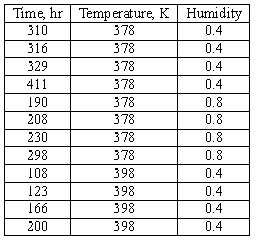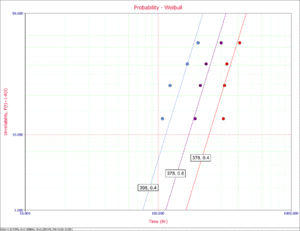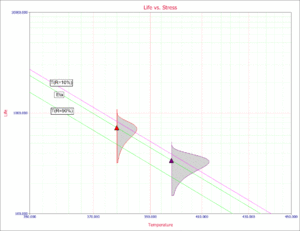Template:Example:T-H: Difference between revisions
Jump to navigation
Jump to search
No edit summary |
|||
| Line 11: | Line 11: | ||
<br> | <br> | ||
::<math>\begin{align} | ::<math>\begin{align} | ||
& \widehat{\beta }= & 5. | & \widehat{\beta }= & 5.874395 \\ | ||
& & \\ | & & \\ | ||
& \widehat{A}= & 0. | & \widehat{A}= & 0.000060 \\ | ||
& & \\ | & & \\ | ||
& \widehat{b}= & 0. | & \widehat{b}= & 0.280599 \\ | ||
& & \\ | & & \\ | ||
& \widehat{\phi }= & 5630.329851 | & \widehat{\phi }= & 5630.329851 | ||
Revision as of 22:17, 16 February 2012
T-H Example
The following data were collected after testing twelve electronic devices at different temperature and humidity conditions:
Using ALTA, the following results were obtained:
- [math]\displaystyle{ \begin{align} & \widehat{\beta }= & 5.874395 \\ & & \\ & \widehat{A}= & 0.000060 \\ & & \\ & \widehat{b}= & 0.280599 \\ & & \\ & \widehat{\phi }= & 5630.329851 \end{align} }[/math]
A probability plot for the entered data is shown next.
Note that three lines are plotted because there are three combinations of stresses, namely, (398K, 0.4), (378K, 0.8) and (378K, 0.4).
Given the use stress levels, time estimates can be obtained for specified probability. A Life vs. Stress plot can be obtained if one of the stresses is kept constant. For example, the following picture is a Life vs. Humidity plot at a constant temperature of 338K.


